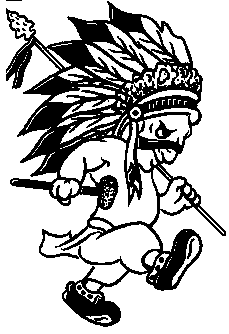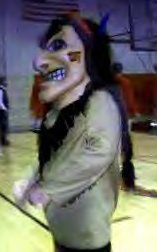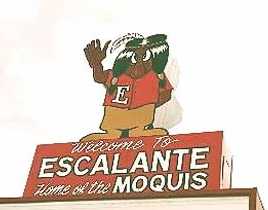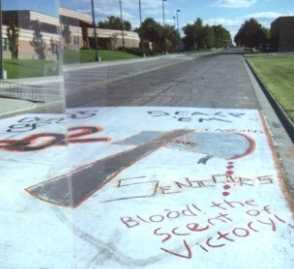

 Another Stereotype of the Month entry:
Another Stereotype of the Month entry:


 Another Stereotype of the Month entry:
Another Stereotype of the Month entry:
No Sense In Anti-Mascot Crusade
Published On Wednesday, December 06, 2006 12:05 AM
By JONATHAN LEHMAN
Crimson Staff Writer
The best move Harvard athletic director Bob Scalise made last week wasn't reappointing Tim Murphy as the school's football coach. That was something of a no-brainer after Murphy helmed the Crimson during another winning season and emerged validated from the myriad disciplinary issues that cropped up around the squad during the summer and early fall.
No, the best thing Scalise has done recently is to do nothing at all. That's compared to Dartmouth AD Josie Harper, who recently issued a written public apology in the campus newspaper to "the Native American community, and the Dartmouth community as a whole," for scheduling a men's hockey game between the Big Green and the University of North Dakota Fighting Sioux. According to Harper, "UND's position," i.e. having a nickname and mascot that invoke a native tribe, is "offensive and wrong."
Groan.
At heart, this is an issue of 21st century political correctness. The history of unjust dealings with Native Americans is utterly reprehensible and there's an impulse to try to make amends now, post-violence, by outlawing stereotypical depictions of indigenous culture. Or, wait, is it American Indians? The list of too-sensitive nouns and verbs is changing and expanding so rapidly I fear I'll be consigned to writing columns composed only of prepositions by the time my stint in this space is over.
The NCAA, by banning 18 schools with "hostile or abusive" mascots from postseason play last August, is the true instigator of this complaint. The update issued by the organization in late April indicates that six offenders, including North Dakota and Illinois (Fighting Illini), remain, four, including Florida State and Utah, have been excused, five have changed or are changing their nicknames, and four linger under some form of review. Harper and Dartmouth's athletic department are falling in step with the attitude of the self-righteous NCAA (don't get me started on its simultaneous touting of amateurism and commercial exploitation of college athletes), supposing moral superiority in condemning UND and misdirecting its energies towards social justice when it should be trying to improve its crummy football and basketball teams.
My intellectual instinct is to oppose potential hypocrisy, and I don't believe a bright line exists in this case. Let's take a look:
Florida State has earned an exemption because its Seminoles nickname and mascot is endorsed by that selfsame local tribe; North Dakota's Sioux have issued no such pardon. But an accurate threshold can not be express approval. What then of the Bears, a perennial Dartmouth opponent? Does Brown have the consent of our ursine friends? You think I'm kidding.
On a human level, though, how about the USC Trojans? Descendants remain of ancient Ilium, sacked by the Greeks many moons ago (dirty trick that horse was, huh?), and old King Priam. Have they been consulted about the school's mascot Traveler, a white horse with an armored warrior astride? That militaristic imagery certainly depicts residents of Troy in a potentially hurtful way.
What about Notre Dame? That venerable institution has a leprechaun as its mascot and the Fighting Irish as its athletic nickname. See the similarities? I didn't think so-it's okay to caricature the Celts because they're white.
If the problem is lumping all Sioux, a nomadic Plains people, under the heading "fighting," or the extraction of visual generalizations from group names, did Harper consider the Big Green men's hoops team's first two opponents in 2006, George Washington and Massachusetts? The GW Colonials mascot is a presidential look-alike in a powdered wig and breeches. Is the implication that all American colonists were white and wealthy? Because that belittles the poor artisans and black slaves.
Even more aptly, the UMass mascot is a Minuteman. Were all Revolutionary-era Massachusetts residents soldiers, violent dispensers of rebel justice with rifles drawn and bayonets affixed? Of course not. Yet no one complains in these cases, because the subjects belong to the culturally-dominant ethnic group.
Finally, what are we to make of Dartmouth's fellow Ivy institution Penn, and its nickname, the Quakers? Or ECAC rival Union (Dutchmen), for that matter? The parallel to UND is that the nickname is a nod to the ethnic/religious group that used to form a majority in the area where the school is located. If it is simply impolite to cite such a group, Penn wouldn't get off scot-free. But I'm being silly! Everyone knows the Friends practice pacifism. Very few people know that Native Americans didn't scalp their enemies for recreation.
And thank me for not thoroughly delving into the implications of perhaps the collegiate level's most controversial moniker, the Rebels of Ole Miss, which can be read as a tacit approbation of slavery and the Confederate cause.
The Crimson's news coverage of this story last week quoted the executive director of the Harvard University Native American Program: "It is inappropriate to have these mascots representing native people-they don't." The idea that a mascot should be an accurate representation is absurd. That would be the end of mascots. Sports is the domain of the generality and the cliché. UND is a stupid school with a stupid nickname. Why make more of its mascot than that?
Because of the racial component. I almost forgot. She continued: "I think they are legacies of stereotypes and really portray native peoples in caricatures. It's part of an American myth that we need to rectify." Kind of like how George Washington's mascot portrays colonial people in caricature and UMass promulgates the myth of the Minutemen? Where's the rectification brigade on that one?
And forbid we should look to the positive side of a Native American mascot: the acknowledgement of regional predecessors or the ideal of a courageous spirit and physical prowess that the teams in question hope to emulate.
It's easy, Ms. Harper, to throw stones when your house isn't glass but Green. The Harvard athletic administration, in a similar position, with a harmless hue as its nickname, didn't take the bait, and for that it deserves some credit.
It's just too bad that the Harvard women's basketball team missed playing Arkansas State in the Contra Costa Times Classic tournament this past weekend. I think the Crimson would've slaughtered the Indians.
-Staff writer Jonathan Lehman can be reached at jlehman@fas.harvard.edu.


Readers respond
Not All Mascots Reinforce Positive Cultural Stereotypes
Published On Friday, December 08, 2006 1:34 AM
By ELIZABETH P. KURTZ
To the editors:
"No Sense in Anti-Mascot Crusade" by Jonathan J. Lehman '08 is symptomatic of a narrow mind. What this column fails to recognize is that many mascot names are generally acceptable because they reinforce positive cultural stereotypes (e.g., Minutemen, Colonials) or challenge non-negative cultural stereotypes (e.g., Fighting Quakers). On the other hand, most mascot names that refer to Native Americans reinforce negative cultural stereotypes: the Redskins (harking back to the notion that all Native Americans have red skin), the Fighting Sioux (reminding us that even until the 1950s, American children watched TV shows that depicted "the Injuns" as warrior peoples).
If cultural progressivism is about creating inclusive communities where everyone has adequate opportunities to mold his image for himself-and especially historically marginalized peoples, like Native Americans and African Americans-then acknowledging and respecting the wishes of Native American leaders and communities to change sports mascots they do not view as positive symbols of their communities seems like the least we can do to create a more progressive society where more people have a seat at the table of democracy.
ELIZABETH P. KURTZ '08
Column Insensitive to Native American Community
Published On Friday, December 08, 2006 1:32 AM
By APRIL D. YOUPEE-ROLL
To the editors:
To say that sports column "No Sense in Anti-Mascot Crusade" (Dec. 6) by Jonathan J. Lehman '08 was hurtful and unacceptable would be an understatement. Not only were the actions of Dartmouth Athletic Director Josie Harper taken out of context, but an inappropriate comparison has been drawn between Harvard and Dartmouth, which the author wrongfully claims are "in...similar position[s]" regarding this issue. Further, the tone and wording of the article seem deliberately cruel to and ignorant of the native community on Harvard's own campus.
In no way should Harper's apology be construed to apply to or, frankly, to have anything to do with Harvard. The apology was addressed to the Dartmouth community and served to affirm the view of the Dartmouth Athletic Department that the mascots which the NCAA has deemed "hostile and offensive" are indeed so. Harper was speaking in the context of several recent events at Dartmouth-events of such magnitude that Dartmouth's president has officially addressed them and, just last week, sparked a "Solidarity Against Hatred" rally attended by several hundred Dartmouth students, staff, and faculty.
While Native Americans at Harvard College (NAHC), the Harvard University Native American Program (HUNAP), and several individual native Harvard students have supported Dartmouth's native community throughout this fall, neither NAHC nor HUNAP have asked for any such apology from Harvard's athletic department. To suggest that we are being denied one is a misrepresentation of the campus climate and places Harvard's native community in an unnecessarily polarizing position on campus. While it is the position of HUNAP and of NAHC that such mascots are offensive and wrong, it should also be noted that Harvard's athletic department has adopted a policy of not scheduling games with schools on the list of offensive mascots released by the NCAA (save matches that were scheduled before the list was released). Thus, Harper's apology is specific to "the Native American community and the Dartmouth community as a whole," both native and non-native, in light of the climate and events on Dartmouth's campus and the position that Dartmouth has adopted since the tournament was scheduled.
In addition, the tone, wording, and examples used within the column are personally abusive. Most glaringly, the article is unnecessarily concluded with, "I think the Crimson would have slaughtered the Indians." It is no consolation that this was meant to refer to an athletic team, as the further dehumanization of the "Indian" moniker-no matter how tongue-in-cheek-only contributes to the politically correct debate that the author so sarcastically laments. Furthermore, the examples cited compare Native Americans to animals and, as is the case of the Trojan mascot, insinuate that real native peoples no longer exist, only their descendents. This type of characterization and generalization, in addition to the hostile tone in which the article is written, is hurtful and ignorant. It renders the article ineffective at instigating any type of real debate or discussion about the issue, which is also exemplified in the writer's lack of communication with the Native American community or Harvard's athletic department regarding this story. What results is not a useful catalyst for discussion, but an inflammatory diatribe that seeks only to provoke and polarize.
If any fair comparison can be drawn between Dartmouth and Harvard at this time, it is this: while Dartmouth's athletic director, in light of campus events, felt the need to apologize to the Dartmouth community, so should The Crimson and Jonathan Lehman address the concerns of and apologize to Harvard's native community for an article which was both misinformed and deliberately callous.
APRIL D. YOUPEE-ROLL '08
The writer is president of Native Americans at Harvard College.
Wow, thank you for proving your ignorance so perfectly. When you say, "...the Crimson would have slaughtered the Indians" you make light of a tragic historical situation. What if your grandmother had really been slaughtered, her unborn child slashed from her womb. It happened in the Sand Creek Massacre, the Pequot War, er, make that MASSACRE, Wounded Knee, the 1 million dollars paid by the government in a single decade in California for bounties paid for Indian scalps at 50 bucks a head....and don't ignore the mountain of myriad other offenses, genocide, theft of children, and cultural decimation that happened in almost every state. A pun, Slaughtered the Indians? Good God, man, have you no soul???
Obviously, you seem to think this was all so far in the past that it is now okay to make jokes about it. Just like the headline in the Kansas newspaper, "Orioles shoot down Indians" from a few years ago, I am sure you get a kick out of that, too. Such idiotic comments show up repeatedly in newspapers when ignorant writers make seemingly clever puns at the expense of real tragedy suffered by real human beings. And why do they show up? Because of the team names and mascots. My God! I am deeply so offended by your comment and the ignorance you exhibit by not even seeing that you have proven the point of your detractors.
And just so you are aware, way down below your ivy climbing tower of white privilege, Civil Rights violations against Native Americans still go on out west, in the land of the "Fighting Sioux." We are a Civil Rights organization (www.changingwinds.org) that take complaints of such violations, some more violent and reminiscent of Jim Crow than you can imagine from the lofty tower in which you sit.
Whether or not the team names and mascots are right or wrong is not up to YOU to judge. Leave it to the people it effects to decide, the Native Americans, American Indians, First Peoples, and Indigenous Peoples. (So sorry you find it tedious to have to deal with the multitude of names for a group of people who solidly prefer not to be portrayed in any one single way.) When your group of people suffers from poverty on a level you cannot understand, from racism on a level you cannot understand, from health issues on a level you cannot understand, perhaps you will be in a position to comment (http://changingwinds.org/CivilRights/Complaints.htm). PLEASE spare us all in trying to make others think you have even an inkling about the fact that this goes far beyond a politically correct problem. I will enclose the URL for some very good articles to help you learn how distanced you are from understanding any issue that effects those who are not white (http://www.racismagainstindians.org/WhitePrivilege/index.htm).
Do you feel I have stereotyped you in this letter? Good. Feel that. And then go to our websites and see the offenses that we have seen, from forced suicides to forced school drop outs to forced assimilation EVEN TODAY, and FEEL THAT, too. Thank you for giving me an opportunity to put this in writing. I hope it has helped to enlighten you better than the education you seem to have missed at Harvard.
Sincerely,
Christine Rose
Executive Director
Civil Rights Division
Rob's comment
Every issue Lehman raises has been addressed many times before. Here are some responses on the subject:
|
. . . |

|
All material © copyright its original owners, except where noted.
Original text and pictures © copyright 2007 by Robert Schmidt.
Copyrighted material is posted under the Fair Use provision of the Copyright Act,
which allows copying for nonprofit educational uses including criticism and commentary.
Comments sent to the publisher become the property of Blue Corn Comics
and may be used in other postings without permission.